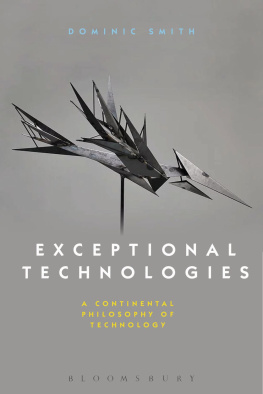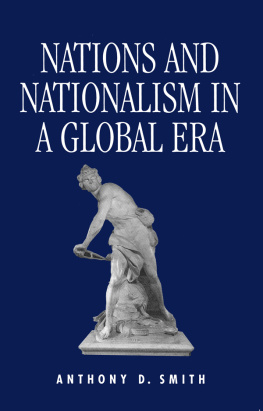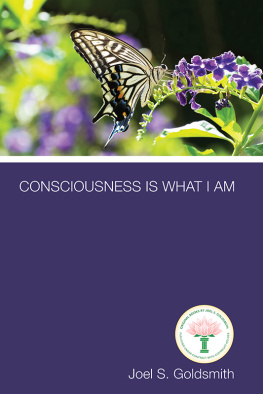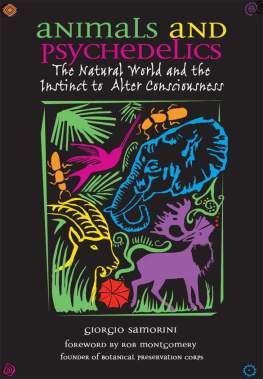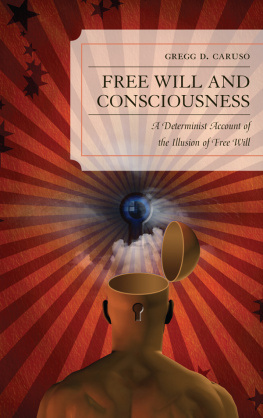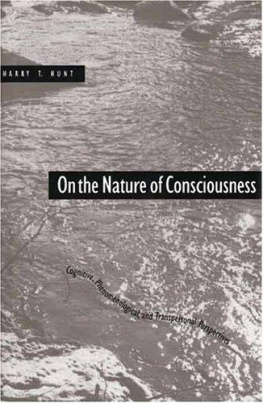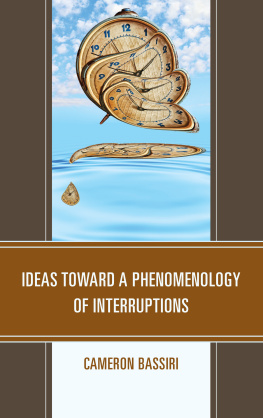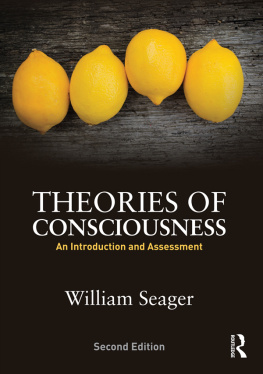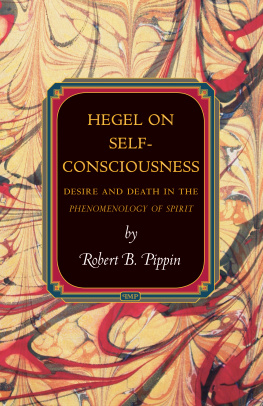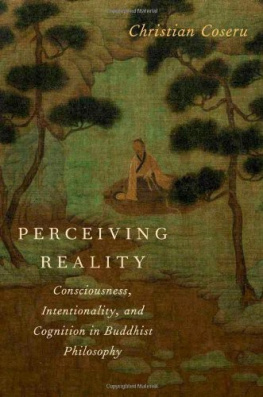Exceptional Technologies
ALSO AVAILABLE FROM BLOOMSBURY
Philosophy and Simulation, Manuel DeLanda
Speculative Realism, Peter Gratton
Epistemology of Noise, Cecile Malaspina
Retroactivity in Contemporary Art, Craig Staff
To Joanna and Orrin, with love
Exceptional Technologies: A Continental Philosophy of Technology
DOMINIC SMITH

Contents
Many different people helped me work towards this book. Colleagues past and present at the University of Dundee helped me find the time and confidence to complete the book (Nicholas Davey, Beth Lord, James Williams, Ashley Woodward, Tina Rck, Oisn Keohane, Brian Smith, Todd Mei and Patrick Levy). Walter Pedriali, James Williams and Brian Smith provided invaluable feedback on early drafts, and participation in the Sujet Digital research group at Paris VIII helped me develop key ideas (special thanks to Pierre Cassou-Nogus, Claire Larsonneur, Arnaud Regnauld, Sara Touiza Ambrogianni, Erika Flp and Gwen Le Cor). Thank you also to Mark Coeckelbergh, Galit Wellner, Pieter Lemmens, Sarah Cook and Yoni Van Den Eede for providing valuable moments of encouragement.
Thank you to the School of Humanities at the University of Dundee for allowing me a research focused semester to work towards completion of the book. Thank you also to Frankie Mace and Liza Thompson at Bloomsbury for their excellent editorial support, and to David Evan Mackay for use of the cover image. Thank you also to Ben Whitney, who first made me aware of the work of Arthur Ganson.
An earlier version of material included in Chapter 2 appeared in a 2015 collection (Larsonneur, C., Regnauld, A., Cassou-Nogus, P., Touiza, S., (eds) (2015), Le sujet digital , Dijon: Les Presses du rel). I gratefully acknowledge permission to reprint this material.
I would like to extend three words of special thanks. First, to all the students I have worked with at the University of Dundee: it has been/continues to be an immense privilege to work with you. Second, my friends and family have been an invaluable source of support and encouragement (especially Mum, Kev and Nola). Lastly, thank you to Joanna and Orrin: you have been closest to me throughout the writing, and I cannot thank you enough. This book is for you both, with love.
The memex, based on Bushs description in As We May Think. Courtesy Elsevier. This image was published in From Memex to Hypertext , Nyce, J. M. and P. Kahn (eds), As We May Think, p 109, Copyright Elsevier (1991) 80 |
Examples of composite photographs from Galtons Inquiries into Human Faculty (1883). Galton, F. (1907), Inquiries into Human Faculty and Its Development , 2nd edn, London: Dent, p 8 87 |
Galtons basic wooden rig, c. 1878. Galton, F. (1907), Inquiries into Human Faculty and Its Development , second edition, London: Dent, p 223 88 |
Galtons more specialized apparatus, c. 1881. Galton, F. (1907), Inquiries into Human Faculty and Its Development , second edition, London: Dent, p 222 88 |
Detail of Galtons brass framing grid, c. 1878. Galton, F. (1907), Inquiries into Human Faculty and Its Development , second edition, London: Dent, p 235 89 |
Bionomial distribution. Quetelet, A. (1846). Lettres sur la thorie des probabilits, applique aux sciences morales et politiques , Brussels: M. Hayez, p 103 95 |
Arthur Gansons Machine with Concrete. Courtesy Amy Snyder. Copyright Exploratorium, www.exploratorium.edu |
Picture Technology as a road down which we are travelling, at night. On either side, the lights of some vast metropolis show up as blurs, flashes and streaks. Some argue we are accelerating too fast down this road, and that we may have lost control of our vehicles.
Philosophy of technology is the field of contemporary philosophy that aspires to put pictures like this into perspective. It does so by undertaking to systematically investigate the impacts of technologies on one another, and on human and non-human forms of life. While engagements with technologies can be found throughout the history of philosophy, from Plato and Aristotle, to Kant, Rousseau, Marx, Hegel and beyond, philosophy of technology is a relatively young field, and its fortunes as one have been varied. It is commonly held that the term originated with the late-nineteenth-century philosopher Ernst Kapp (Mitcham 1994: 20). In the twentieth century, philosophy of technology can be considered, at best, as a minor subfield of philosophy of science in the analytic philosophical tradition (Bunge 1985). In the continental tradition in philosophy, in contrast, a background concern with technology became so pervasive over the course of the twentieth century as to become a kind of clich . From the phenomenology of Husserl and Heidegger, to the critical theory of Adorno, Arendt and Habermas, to the poststructuralism of Deleuze and Foucault, the basic messages emerging from the continental philosophical tradition
Since the late twentieth century, new impetuses in philosophy of technology have emerged. Against this type of classical continental approach to philosophy of technology, the empirical turn counselled a detailed and pluralistic focus on case studies of technologies in contexts of design, implementation and use (Kroes and Meijers 2000b; Achterhuis 2001; Franssen et al. 2016b). In doing so, it performed some notable services. Conceptually, the empirical turn foregrounded a need to be sceptical of tendencies towards pessimism, determinism and the reification of Technology into some kind of autonomous agent; methodologically, it promoted a more focused and pragmatic approach, against some of the potential pitfalls of more speculative and lyrical ways of thinking about technology evident in the continental tradition.
As this book will argue, however, there is a great deal that is limiting about philosophical turns of this kind. For instance, I will argue that although empirical turn approaches have been right to criticize a continental tendency towards the reification of Technology, they have tended to perpetrate the same mistake against the broader continental tradition: by turning a commitment to transcendental method that has been prevalent throughout this tradition since Kant into metaphysical commitment to some form of reified Transcendental realm. Second, I will argue that philosophy of technology in the wake of the empirical turn has often been committed to a sense of what constitutes a Technology that leaves too much to common sense. Third, I will argue that the empirical turn has laid down a problematic precedent for innovation in philosophy of technology, through commitment to a crude picture of turning that seems trivial, but that may in fact have important negative consequences for work in this field.
But why should these points matter beyond a narrow and specialized concern? To hopefully see why, reconsider the picture of the road with which I began. The point is that this is the kind of simplification that is pervasive throughout contemporary thinking about technology: it is, as Wittgenstein famously put it, the kind of picture that can hold us captive, because the conditions for it [lie] in our language (Wittgenstein 2009: 53).and inspect the road itself in minute detail, in the hope that the smaller pictures rendered might either dispel the misleading spectre of Technology, or that they might scale up into a better approximation of where we are coming from and where we are going.

